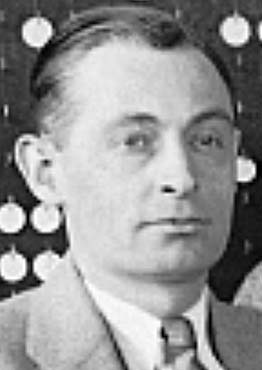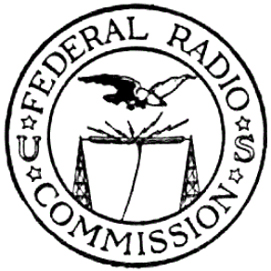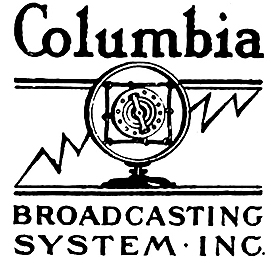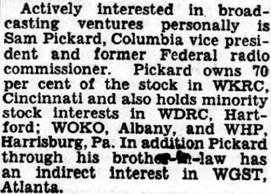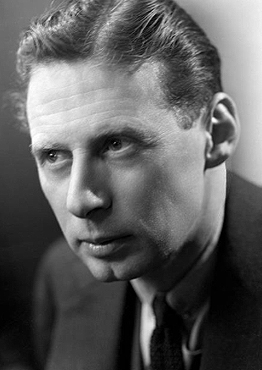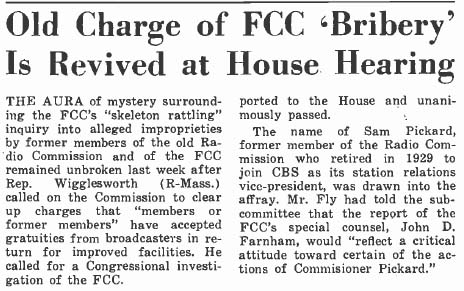
©
2020-2026
Man From Mars Productions
|
Pickard-Lowman
|
 |
| The question is sometimes asked, why did WDRC relocate to Hartford after eight successful years on the air in New Haven? It had to do with a network affiliation. This is the story of two vice presidents at the Columbia Broadcasting System (CBS). They were key characters in the same story - but fate had very different endings for them. |
|
Samuel
Pickard December 1, 1896 - born in Creston, WY; moved to Iowa where he attended Seymour High School 1913-1916 - attended University of Kansas; served as editor of the college newspaper and worked briefly as editor of the Aurora (MO) Daily Light 1917 - enlisted in the Army Air Service & trained with the Royal Flying Corps in Toronto...served in the Argonne area of France and was shot down 11 days before the Armistice...severe wounds plagued him for the rest of his life 1919 - after a year's hospitalization, returned to the U.S. and became a commercial and acrobatic pilot in the midwest 1919 - married Francke Palmer 2,000 feet over the Missouri County Fair after a five-day romance 1921 - briefly ran a pilot's school in Kansas City, MO; joined Kansas State Agricultural College as publicity director 1923 - established KSAC, the College of the Air, designed to educate farmers 1925 - accepted position at U.S. Department of Agriculture in Washington to organize a broadcasting service. February 23, 1927 - transferred to the Federal Radio Commission (FRC) as its first secretary October 15, 1927 - appointed as Radio Commissioner for the midwestern zone, replacing Henry A. Bellows who resigned February 1, 1929 - resigned FRC post to join Columbia Broadcasting System (CBS) 1930 - leased WGST Atlanta from Georgia School of Technology for a 10-year period October 1931 - CBS bought WKRC Cincinnati for $292,000; Pickard owned 60% of the sellers stock June 1, 1936 - CBS VP of station relations (part owner of CKLW Windsor-Detroit; still had interests in WDRC and WGST) June 1, 1936 - retired from CBS as VP in charge of station relations; continued as consultant through the end of the year 1936 - owned homes in Larchmont, NY, Florida and San Francisco; purchased 30-acre farm in Flat Rock, NC June 1, 1938 - chief stockholder of KXBY Kansas City and associated broadcasting school; Pickard's brother-in-law, Richard K. Phelps was general manager January 1939 - FCC records indicate he owned 138 shares of WHP Harrisburg, PA...300 shares of CKLW Windsor/Detroit...656 of 2,250 shares of KITE Kansas City...and 240 of 1,000 shares of WOKO Albany, NY November 1941 - fully retired from CBS; sold his interest in KITE Kansas City July 1943 - FCC held hearing on license renewal of WOKO Albany; it was revealed that Pickard sold his 24% ownership stake but since 1934 it had been reported as belonging to his brother-in-law, R.K. Phelps 1945 - listed in the Florida State Census as 49-year-old retired Dade County resident March 1945 - attorney for WOKO proposes Pickard be required to sell his 240 shares at 20% over depreciation as punishment for not revealing his status as shareholder March 31, 1945 - cleared for overseas duty as American Red Cross assistant field director January 9, 1947 - Pickard sold his interest in WOKO Inc. to the corporation for $108,000 (by this time WOKO had lost a USSUPCO fight to reverse the FCC's license denial) October 22, 1965 - died in Crystal River, FL at the age of 68 |
In the earliest days of broadcasting it was clear that the federal government was going to play a regulatory role. At first the task was assigned to the U.S. Commerce Department as it was clear that radio waves paid no heed to state lines and interstate commerce would result.
Commerce neither wanted the job nor was it equipped for it, so Congress created the Federal Radio Commission (FRC) in 1927 to untangle the logjam of stations interfering with each other on too few frequencies. This was supposed to be a temporary mission but proved to be such an undertaking that seven years later Congress passed the Communications Act of 1934, permanently replacing the FRC with the Federal Communications Commission (FCC), which still exists today. As the industry grew, stations naturally wanted to attract better talent and greater revenue. On November 15, 1926 the National Broadcasting Company (NBC) was formed, tying stations together via telephone lines providing wider exposure to the big stars of the era, and better programming for the affiliated stations. The Radio Corporation of America (RCA) owned 50% of this first commercial network; it also manufactured consumer and professional radio equipment and operated a successful record label. WDRC was one of 16 charter NBC stations but dropped the affiliation in March 1927. Meantime, an outfit called United Independent Broadcasters Association tried to compete with NBC but its financing was so shaky that telephone companies wouldn't lease long distance lines to them. In 1927 another record label - the Columbia Phonograph Company - merged with United to create a new network called the Columbia Phonograph Broadcasting System. It soon shortened its name to CBS.
Back in New Haven, Franklin M. Doolittle's WDRC was doing okay but was not affiliated with a major network. At the same time CBS was looking for an affiliate to fill in a dead spot in its coverage between Boston (WEEI) and New York (WABC). A perfect location would be somewhere near Hartford, CT and Springfield, MA. It's not clear which party approached the other, but a deal was struck to relocate WDRC to Hartford and join CBS. The deal was done on December 5, 1930 when the station became the 76th CBS affiliate. A press release noted that the network had grown 156% in the previous 12 months, increasing its permanent wires facilities from 4,882 miles to 12,528 miles. NBC and CBS had become leaders of corporate America. CBS tended to be awash in vice presidents (the 1959 edition of Television Magazine's Data Book listed 17 of them). Two of the CBS VP's were Samuel Pickard and Larry Lowman. Pickard, who had served as commissioner of the original FRC, oversaw the CBS expansion of affiliates from 47 in February 1929 to 91 by 1933. Lowman was a former college chum of CBS chairman William S. Paley. What wasn't apparent was that some CBS station affiliations came with a condition - an ownership stake in the individual stations. Both Pickard and Lowman also reaped the benefits of investments in non-CBS properties.
|
Lawrence
Wise Lowman January 30, 1900 - born in Philadelphia, PA; spent summers with his grandparents in Lafayette, IN 1917 - worked as a farm hand Summer 1918 - enlisted in the Army Air Force at Princeton, NJ early 1920s - worked in the engineering department of the Pennsylvania Railroad 1924-1926 - student at the University of Pennsylvania 1926-1928 - credit manager of J. Jacob Shannon & Co., contractors, in Philadelphia December 1928 - At the invitation of University of Pennsylvania classmate William S. Paley, joined CBS Radio as traffic manager 1931 - CBS station supervisor 1932 - elected CBS VP/secretary with responsibilities in operations, special events, dramatic series, continuity, educational features, speakers, artists and mechanical issues June 1932 - as CBS VP in charge of operations, oversaw coverage of the Democratic National Convention in Chicago August 26, 1932 - married Cathleen Vanderbilt Cushing, half sister of "poor little rich girl" Gloria L. Vanderbilt March 25, 1937 - CBS VP of public relations May 1937 - signed the U.S. Amateur Golf Association for exclusive rights to broadcast four leading tournaments on CBS 1937-39 - simultaneously served as VP/secretary of Columbia Artists, Inc. 1938 - promoted to CBS VP in charge of network operations April 1, 1939 - FCC records indicate he was a director of WDRC Inc., holding 112 of its 500 outstanding shares, 111 shares of WHP Harrisburg, PA, and 350 shares of CKLW Windsor/Detroit June 8, 1940 - divorced from Cathleen June 21, 1941 - married Eleanor (Barry) Ryan, a fashion editor at Harper's Bazaar Spring 1942 - duties included liaison chief between CBS and its affiliates; Columbia Artists Bureau and Columbia Concerts Corporation; network representative in labor relations; and supervision of program operations. June 1942 - commissioned as an Army major; Chief of the Communications Branch, Office of Strategic Services; achieved the rank of colonel July 1, 1945 - returned to CBS as VP in charge of television June 1946 - awarded Legion of Merit award for organizing a worldwide clandestine communications system by which vital information was transmitted from within enemy countries to Allied headquarters May 1948 - promoted to VP and general executive of the CBS network with responsibilities in personnel relations, reference, and shortwave departments December 1948 - vice president of Tournaments of Champions, Inc., formed to promote and stage major sports events on television October 1962 - CBS VP of personnel August 1963 - Securities & Exchange Commisssion filings indicate he bought 3,150 shares of CBS stock and owned 8,688 February 1965 - Securities & Exchange Commisssion filings indicate he owned 23,879 shares of CBS stock 1968 - retired from CBS February 22, 1980 - died in Stamford, CT at the age of 80 |
|
Pickard seemed to bask in the limelight while Lowman tended to stay low-key. The Heinl Radio Business Letter, a trade publication, reported in November 1931 that Sam had enjoyed much of the $200,000 sale price of WKRC in Cincinnati and could "now be seen on Fifth Avenue sporting a frock suit, silk hat, cane and spats. When last seen in Washington, the former Kansan was accompanied by a wolfhound almost bigger than he was." In June 1932 the FRC began looking into irregularities in station ownerships. They focused on the capital of Pennsylvania when it became apparent that the Harrisburg Telegraph newspaper owned 60% of the stock of station WHP - and 75% of the stock of rival station WCOD. The other 40% of WHP was owned by four men including Pickard and Lowman. In May 1933 WDRC's Franklin M. Doolittle testified at another FRC hearing that Sam Pickard and Lawrence Lowman of CBS each owned 112 shares of the station's stock; a third CBS vice president, Harry C. Butcher, owned another 25 shares. The next month Pickard and his wife embarked on a three-month vacation in Florida. The June 15 issue of Broadcasting Magazine described him as "better than well-to-do as a result of prudent investment." In May 1936 trade publications reported that Pickard would retire from active service at CBS at months' end, though he would continue as a consultant until the end of the year. His broadcast assets still included WDRC, CKLW Windsor/ Detroit, and full control of WGST Atlanta, a CBS outlet. The State of Georgia maintained that WGST was leased to Pickard's Southern Broadcasting Co. without permission of the legislature, in violation of state law. By May 1938 Pickard was the chief stockholder of KXBY in Kansas City, and his brother-in-law Richard K. Phelps, was general manager. By early 1939 the FCC was investigating overlapping station licensees, group ownerships and "interlocking directorates." It was noted that Lowman still owned 112 of WDRC's 500 shares of stock, and he was a co-owner of WHP Harrisburg along with Pickard, who still had an interest in the Kansas City station. The FCC convened confidential hearings into station ownership transactions in June 1942. Broadcasting Magazine reported there may have been irregularities involving members of the early FRC, including Pickard. Meantime, Lowman was on leave from CBS to serve with the Army's Office of Strategic Services in Washington. In October, the case spilled into the public as the Commission was called on to reveal if members of the FRC or FCC, past or present, had "taken payments from broadcasting firms in return for official favors." One congressman believed Pickard "had been guilty of grossly improper conduct while in office" at the FRC. It was alleged that Sam had advanced the interests of a major network (the name of which was deleted from the record) "at a time when Mr. Pickard was anticipating an early association with that network."
In November 1942 the FCC denied a license renewal for the Kansas City station (now called KXKX), 37.15% of which was ownded by Sam Pickard. The station had failed to show up for a hearing the previous month. Pickard's problems worsened the following January when the Commission scheduled a renewal hearing for WOKO in Albany, NY. The FCC planned to determine if the licensee corporation had been forthcoming over its ownership and stock transactions. Pickard was not listed as a stockholder, though his brother-in-law, R.K. Phelps, was. The clear implication was that Pickard had maintained a secret, unreported interest in the station, in violation of FCC regulations. Legal proceedings dragged on through 1943. In June the FCC ordered Pickard and his partners to sell outstanding stock in WGST. All assets of their corporation were acquired by the Georgia School of Technology. Back in Albany, testimony indicated that Pickard had acquired 240 shares (24%) of WOKO way back in 1931 but Sam's name had been kept out of all subsequent FCC filings. WOKO's general manager said Pickard had asked him not to divulge his ownership interest. Pickard himself testified that in 1933 CBS president William S. Paley told him he was "embarrassed" by Pickard's outside interests. To appease the boss, Pickard engineered a transfer of the stock to the brother-in-law, Phelps, whose name appeared in official records even though dividends went to Pickard. It also came out that Pickard had given 10% of his WOKO interest to Lawrence Lowman in 1932. Lowman turned that stock over to Mrs. Pickard, saying he wanted no part in the arrangement. Pickard admitted to FCC attornies that he had made similar arrangements with other stations in order to secure CBS affiliations. The proceedings drew to a close in late September 1943. The following fall the FCC decided not to renew WOKO's license because of the fraudulent misrepresentations. The station's attorney suggested Pickard be made to sell his stake for 20% over depreciation. The case dragged on as WOKO appealed it license rejection to the U.S. Court of Appeals in the District of Coilumbia. It slowly wound its way to the U.S. Supreme Court which, in December 1946, upheld by an 8-0 vote, the FCC decision to deny WOKO's renewal. At the end of the day Pickard sold his stock and ended up with $108,000 in his pocket. Why did this case tarnish Sam Pickard's reputation and not Larry Lowman's? While employed by CBS they had both pursued outside broadcast interests, realizing substantial financial gains, and both held stock in WDRC for years without running afoul of the government. The reason was that Franklin Doolittle was always forthright in declaring their ownership interests in his correspondence with the FRC and, later, FCC. And Lowman never concealed his interests while Pickard did for more than a decade. Lowman continued a long career with CBS, assuming major responsibilities for the development of television, until his retirement in 1968. Pickard's CBS days ended in 1936, long before his troubles became evident. He retired to Florida and reinvented himself as the developer of Paradise Point resort in Crystal River, an hour north of Tampa. He added a retirement community known as the Village of Picardy. An October 17, 1954 article in the Tampa Bay Times embellished his resume, describing him as a "co-founder of the Columbia Broadcasting System." A Tampa Tribune article, published June 1, 1963, claimed he was a former member of the FCC (he wasn't; he served as a Commissioner of the FRC), and had joined CBS in 1929 "and operated the network for 10 years." Mr. Paley and the plethora of CBS vice presidents might have disputed that claim. Pickard sold his real estate holdings and retired again in 1963. He died two years later at the age of 68. |
